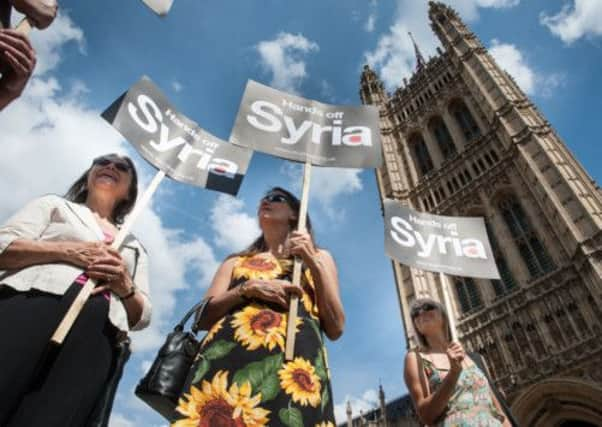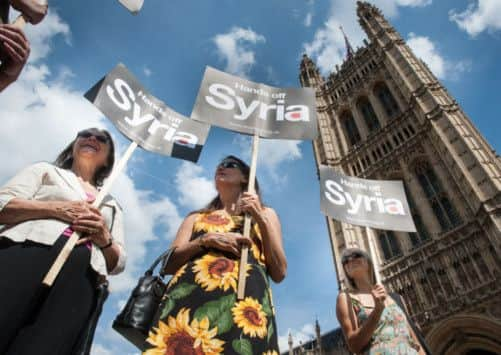Cameron strikes back over Syria defeat


The Prime Minister suffered a humiliating defeat in the Commons last night as MPs rejected a motion on the principle that military action could be required to protect Syrian civilians.
But he insisted the UK remains “deeply engaged” on the world stage despite the blow dealt by MPs.
Advertisement
Hide AdAdvertisement
Hide AdSpeaking in Downing Street, he said it was a “regret” that he had been unable to build a consensus on the response to the atrocity in Syria.


Mr Cameron said: “I think it’s important we have a robust response to the use of chemical weapons and there are a series of things we will continue to do.
“We will continue to take a case to the United Nations, we will continue to work in all the organisations we are members of - whether the EU, or Nato, or the G8 or the G20 - to condemn what’s happened in Syria.
“It’s important we uphold the international taboo on the use of chemical weapons.
Advertisement
Hide AdAdvertisement
Hide Ad“But one thing that was proposed, the potential - only after another vote - involvement of the British military in any action, that won’t be happening.
“That won’t be happening because the British Parliament, reflecting the great scepticism of the British people about any involvement in the Middle East, and I understand that, that part of it won’t be going ahead.”
Mr Cameron said he would not have to apologise to US President Barack Obama for his inability to commit British forces to any coalition.
Ministers have suggested the Commons defeat could put a strain on the special relationship with Washington after the US made a request for British help.
Advertisement
Hide AdAdvertisement
Hide AdBut Mr Cameron, who has not spoken to the president since the vote, said: “I don’t think it’s a question of having to apologise.”
The Prime Minister acknowledged “politics is difficult” as he set out the reasons behind the decision to recall Parliament for the vote on Syria.
He said he wanted to act “in the right way”.
“I was faced with three things I wanted to do right and do in the right way,” he said.
“First of all, to condemn absolutely and respond properly to an appalling war crime that took place in Syria.
Advertisement
Hide AdAdvertisement
Hide Ad“Secondly, to work with our strongest and most important ally who had made a request for British help.
“Thirdly, to act as a democrat, to act in a different way to previous prime ministers and properly consult Parliament.
“I wanted to do all those three things. Obviously politics is difficult - that involved going to Parliament, making an argument in a strong and principled way but then listening to Parliament.
“I think the American people and President Obama will understand that.”
Advertisement
Hide AdAdvertisement
Hide AdFormer Liberal Democrat leader Lord Ashdown said the UK was “hugely diminished” as a result of MPs’ refusal to agree to the principle of military intervention and Chancellor George Osborne said there would be “soul searching” about the nation’s role on the world stage.
But Mr Cameron insisted the Government and Parliament remain “deeply engaged in the world”.
Highlighting the UK’s military power and diplomatic influence, he said: “We have great strengths as a country, we should continue to use those.
“But on this specific issue, because of the huge concerns about this appalling Syrian conflict and people worrying about how we might get sucked into it, on that specific issue that trumped, as it were, the sense of outrage about the chemical weapons.
“I understand that, I get that.”